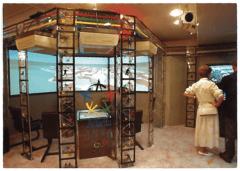“I will be graduating with my degree in Computer Science at the end of this year. My junior design project is actually sourced around being able to use technology to connect medical mission trips to areas like Haiti and Vietnam and the Philippines where devastations have really impacted the people there. But there is no real resource to communicate between doctors to actually get resources there because people don’t even know whether these areas have running water or whether they have oxygen masks. And I really think that technology is pretty much the best tool we’re ever going to get to be able to mass communicate, mass cooperate between regions, be able to really bridge that gap and be able to make differences that we otherwise wouldn’t have been able to in the past.” — Georgia Tech Computer Science undergraduate student and retroTECH Online software donor, December 2018
Under the umbrella of its retroTECH initiative, which provides access to vintage technologies and seeks to inspire a culture of long-term thinking, the Georgia Tech Library’s FCoP project has been to create a proof-of-concept for retroTECH Online, a web presence through which patrons can experience software from retroTECH’s collections for teaching and learning, explore the stories surrounding that software, and engage in a virtual retroTECH community. Our project team used oral history and emulation to tell the stories of several software innovations created by Georgia Tech community members–from the graphical simulation that helped win Atlanta’s 1996 Olympics bid to Game Boy Advance games coded by current students mastering computer science (like the one quoted above). The project has enabled us to grow our oral history program, partner with students to build library code, and realize how essential human stories and relationships are to preserving and providing access to software collections over time.

The focal point of our project has been what we’re calling the “software story.” Through collection development and oral history, we’ve examined possibilities for using retroTECH Online to spotlight the people at the heart of Georgia Tech’s technological pasts and futures. At the outset of the project, the retroTECH team developed a documentation strategy and a set of broad criteria to guide the types of stories we would seek to illuminate. Critically, though, it was our two undergraduate Research Assistants, Maura Gerke and Richa Virmani, who dug through the archives to select the narratives they found compelling and made the stories discoverable. The telling of software stories, the various activities under the heading of “software preservation” in the context of our project, became, on a very small scale, an intergenerational effort of Georgia Tech community members–former faculty, active researchers, soon-to-graduate students–remembering and imagining with each other.
The main deliverable of our project is a prototype of retroTECH Online that explores five Georgia Tech software stories. With the goal of finding, documenting, and giving voice to the stories, we’ve ended up investing most of our efforts into two phases of the digital curation lifecycle, in particular–collection development and access.
Can I just say, there is a lot we hoped to do that we didn’t get to (user testing, curricular integration, better metadata, adding features for commenting or uploading files into the software story worlds). Can I also just say that this took more time than I expected it would, and that it was sometimes messy (scheduling interviews with busy folks, beta testing emulation environments, pivoting through a library website overhaul, staying focused during a building move, juggling local versus cohort priorities, plus, no joke, rare diseases and a pandemic). That doing new things competes with getting existing things in order, while illuminating the dysfunction of current workflows in a way that’s useful for prioritizing what to fix.
But we made a prototype. And we are moving forward. Over the next few years, we will continue to collect and share software stories on a small scale, expanding our scope to include research software and software-dependent projects created in the Library. We will also incorporate the fantastic deliverables of the other FCoP projects and streamline workflows for digital curation, oral history production, and student-driven application development. And we will continue as active participants in allied communities of practice–the Software Preservation Network, the Emulation as a Service Infrastructure nodes, museums preserving vintage hardware and software, and archives stewarding digital architectural collections.
The Software Preservation Network has crucial roles to play in building capacity for software preservation: serving as a coordinator, convener, aligner, and balancer among these communities of practice as, together, we divide-and-conquer progress on the various facets of software preservation work. These communities are each delving into specific segments of the software preservation landscape; an organization like SPN, with its holistic meta-view of the field, is critical to our local on-the-ground progress.
We’re just getting started with software preservation at Georgia Tech, and there are so many directions to investigate–preserving research software for reproducibility, using emulation to facilitate appraisal, figuring out which institutions are preserving which software and why so we all don’t have to reinvent the wheel. But as the field moves forward, I’d be really interested, in particular, to see more work focused on the who of software preservation, the stakeholders, the creators and reusers. Towards our documentation strategy goal of proactively giving voice and archival real estate to underrepresented computing cultures at Georgia Tech, I’d love to embed (virtually?) in a Female Founders software startup at Georgia Tech and study what interests they might have in making their software stories preservable. I’d love to work on requirements gathering for intergenerational user experiences, to explore how preserved software environments can function as generative pedagogical tools. To ask: how can software preservation efforts foster dialogue between software creators of the past and the future?